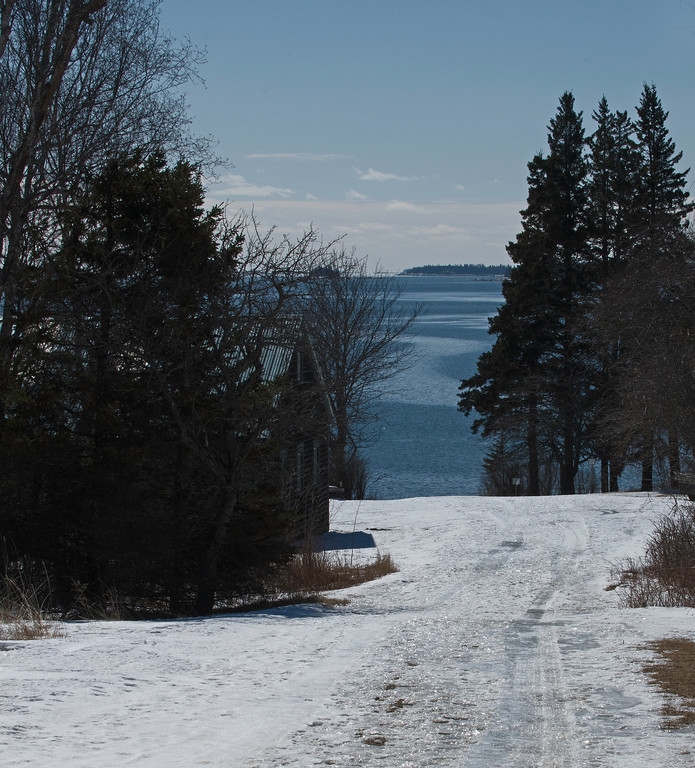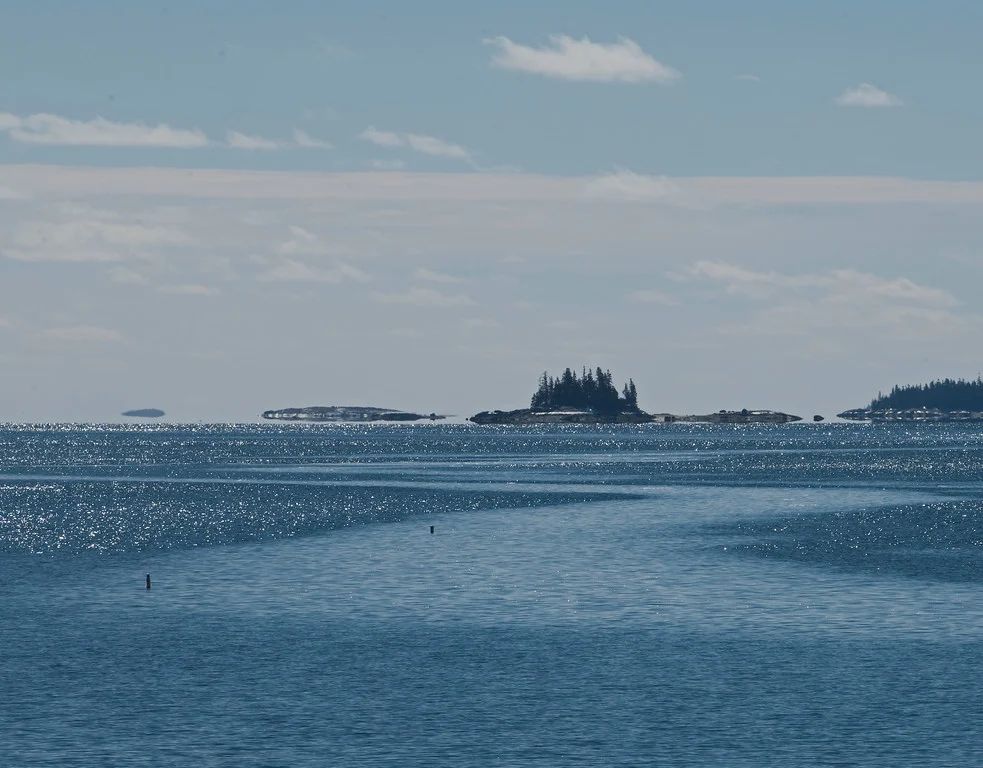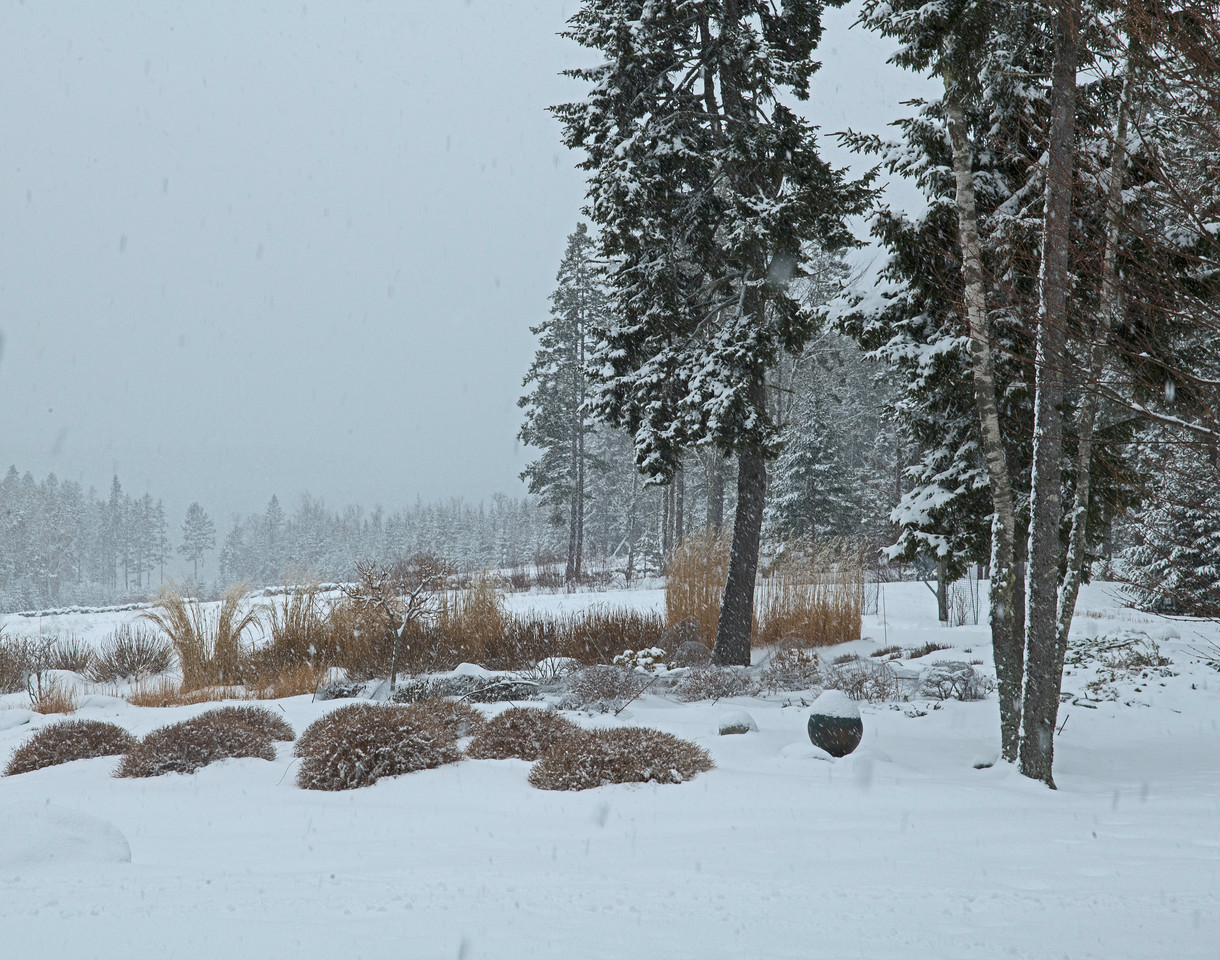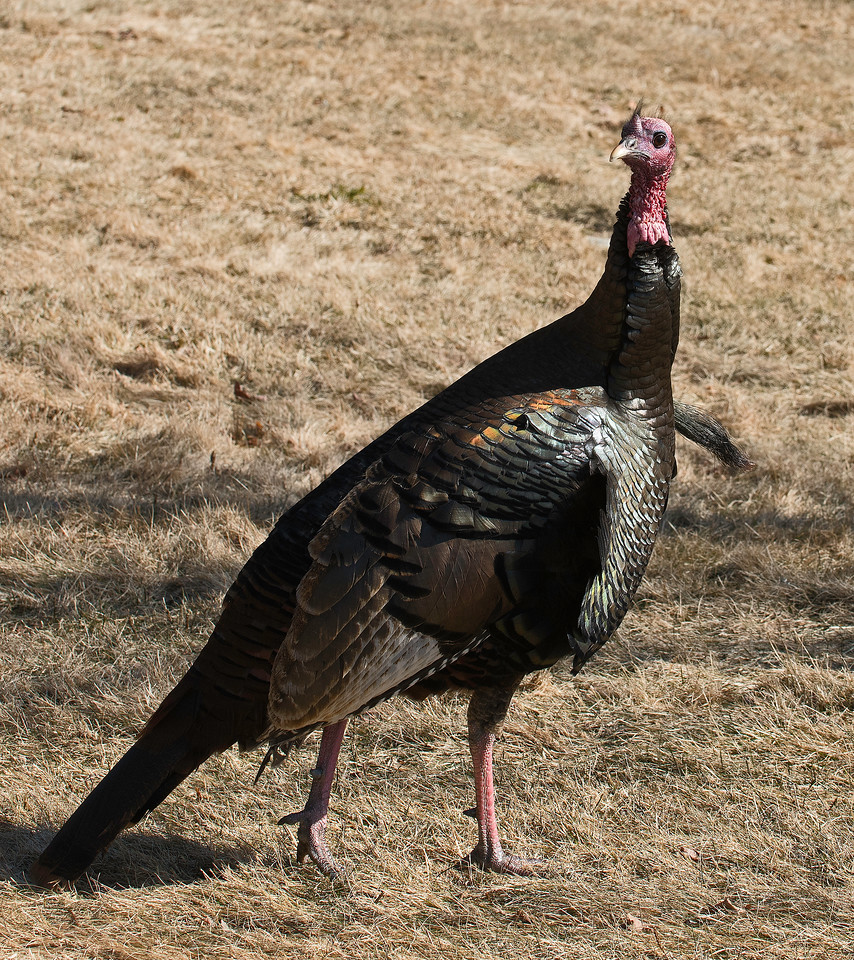This is the image that appeared yesterday in our monthly column in the Ellsworth American.
To read the column, click here: http://www.5backroad.com/montly-column
JOURNAL
This is the image that appeared yesterday in our monthly column in the Ellsworth American.

To read the column, click here: http://www.5backroad.com/montly-column
Yesterday’s sunny meltdown turned into last night’s feeble snowstorm and this morning’s dishwater light. We’re waiting doubtfully for the bright sun that’s predicted for this afternoon. More than that, we’re hoping for an afternoon like the one on Sunday (March 11) shown here: crisp air, fields of untrodden snow, horizons of vibrant woods, and skies of streaming clouds.

It’s March, the month of doubt and hope. (Brooklin, Maine)
In March, parts of the surfaces of our shallower coves become solid with sea ice at high tide; that ice becomes fragmented at low tide when the sea level drops to the bottom. The images below were taken last week. First, there is high tide in part of Conary Cove:

This is low tide in part of Great Cove:

Here is a skim of sea ice trying to form around the Town Dock in Naskeag Harbor:

If it’s cold enough, the sea ice will “heal itself” back into a solid mass after it floats up on the incoming tide. Due to its salt content, sea water doesn’t freeze until its temperature drops to 28.4 degrees (F) and stays there or below for some time. But, the ice contains so little salt that melting it produces drinkable water. (Brooklin, Maine)
This assemble-it-yourself snow plowing starter kit arrived just in time. Trying to figure out how to attach the plow.

(Brooklin, Maine)
Yesterday, March lost control again.

She woke up raw and surly, started snowing in the early afternoon, added sleet for intimidation, then attacked with driving rain to destroy the evidence.

She capped her escapade with a nighttime freeze to turn driveways into ice.

She woke up today clear-headed and warm enough to melt hard feelings, but she can’t remember yesterday. She’s simply got to stop carousing. (Brooklin, Maine)

The temperature yesterday morning was so balmy (36 F) that Amen Farm’s barn was left open, which brought fresh air and smiles to some of its bearded residents.

There were some serious moments, however.

(Brooklin, Maine) .
“Going cold turkey” was easy for some neighbors yesterday; they even seemed brighter.

Sun reflecting from the snow often turns on the iridescence of Wild Turkey feathers.

Although much of our ground is covered with snow and we’ve had some bitter cold days, these tough birds trudge their extensive appointed rounds uncomplaining.

(Brooklin, Maine)
It was a relief to spot these twin yearlings when they reappeared at dusk on Wednesday (March 6). We hadn’t seen them for a while, but we had seen fresh coyote tracks.

The twins are smaller than many of their 2018 White-Tailed Deer birth mates, having been born later in the year. They’re the slowest of the herd in snow. However, their coats are as dense as any and they seem to be enjoying their first winter. As usual, Mom was close by; she’s partial to maple tree suckers when nosing through the snow for dinner is difficult.

(Brooklin, Maine)
You never can have too many gas cans or too much rope in your truck. But, you can have too much snow. This truck was one of several fishermen’s vehicles parked yesterday at Naskeag Harbor. Its trailer apparently held a boat that was used to take the driver out to a scallop fishing vessel.

(Brooklin, Maine)
This charming landmark near the corner of Naskeag and Back Roads looks like it was designed for Maine snow. Owned by neighbor Sharron Ellis, it was built in 1899 — without the porch — by her grandfather, Minard Freethy. The porch was added by Sharron about 1997, but its parts date from the 1850s.

Some think the house originally was a Sears, Roebuck Company catalog house shipped in parts, but Sharon doesn’t think so. It looks more like a version of American Foursquare architecture, which was popular in the late 1800s.

Whatever it is, it’s a friendly sight on the way to the harbor. (Brooklin, Maine)

Waking up in the clarity of the new day after the storm – in bright air and brighter sun; blue sky and bluer sea; whitened spruce and all-white field. Wondrous.

(Brooklin, Maine)
We awoke this morning and watched March – the glorious month of Spring and Daylight Savings Time – doing it again.

We’re in the middle of another one of her snowstorms, with about seven or eight inches of the wet variety already accumulated as we speak.


We lost power in the wee hours, but it came back about 8 a.m. The Mourning Doves are having trouble finding their usual breakfast; the Dark-Eyed Juncos and White-Throated Sparrows have switched to suet, and none of them is thinking about taking a bath.

After it lets up a bit, we hope to get our driveway plowed and then shovel out the house entrance way. If the sun comes out, it will be stunningly beautiful. Meanwhile, we’ve left a light on.

(Brooklin, Maine)
Every now and then, we get a serpentine sea trail in Great Cove, such as this beauty from a few days ago.

We assume that it’s not from a submerged cousin of the Loch Ness Monster. We can see that it’s not from a large school of fish or the wake of a boat with a drunken captain. What causes this?

Research indicates that it might be a rip or a cross-current in the lowering tide with vertical eddies that smooth the surface while meandering below it. Or, it could be from stray cold front winds that wiggle over flat surfaces and leave water signatures. Or, it could be part of a “Langmuir Circulation.” (Don’t ask.) Or, it could be something else. Feel free to share your own theory in a comment. (Brooklin, Maine)
What do some boats have in common with bears? They hibernate. (“HIBERNATE: Verb (1) To pass the winter in a torpid or resting state; (2) to be or become inactive or dormant.”)

Speaking of which, we heard a sound in one of the WoodenBoat School’s buildings yesterday and snuck in. (Don’t tell anyone.) It was, as expected, just a dory snoring. They have deviated nasal septums, you know. (Brooklin, Maine)
There’s snow and ice on the ground and it’s below freezing here, but our Northern Cardinals are starting to court. These birds are among the earliest nest-builders, sometimes starting home construction as early as February.

The red males singing on leafless winter branches are so obvious that we wonder whether they’re an example of evolution gone wrong. They seem to be advertising, “Red Hot! Get your hawk food here!” As far as these bright male Cardinals are concerned, however, it’s apparently worth the danger – the reddest males attract the most females. Here’s an interested female:

Researchers have concluded that female Cardinals consider red brightness to be a significant predictor of a healthy mate. “Seeing red” is a good thing when it comes to Cardinal speed-dating. Lightly-colored males such as this one get what’s left:

(Brooklin, Maine)
February is the last full month of winter. This year, we had the usual cycle of the month’s contradictions: snow storms that brought ephemeral beauty and white stuff that had to be plowed and shoveled; Arctic air that froze the ground followed by warm thaws that caused frost heaves; gray days followed by squinty-bright ones with the bluest of skies and seas.


This month’s cold weather and snows seemed to be no problem for our perenial winter neighbors: Wild Turkeys, Common Eiders, and White-Tailed Deer.


February is a good time for water-watching. The fresh water streams are full and robust; the coastal vistas are enchanting, and the sea often is glimmering and studded with sea ice.



The local lobster boats that remain in the water during February were transformed in December into scallop trawlers with booms and masts or they become platforms for diving for those scallops.

Ice-encrusted British Soldier Lichen (“The Red Coats are coming!”) and Rhododendrons curled into rockets show the effects of February’s temperatures and winds.
Neighbor Judith Fuller’s ever-changing roadside banners this February included commemoration of Super Bowl LIII (won by our New England Patriots) and Valentine’s Day.
New England architecture displays its practical beauty in February’s snowy days.

Finally, there are the extraordinary winter sunsets and their afterglows in February, often our last “cold gold” skies of the year.

(All images in this post were taken in Down East Maine in February 2019)
We’re looking at a window that’s more than 100 years old. I’ve photographed it many times and, each time, it reveals new truths, often only about me. It looks out from the one-room Chapel on Naskeag Road known as Beth Eden.

It sees a line of bare maple trees that cast their shadows and reflections on it, as if trying to get to know it by feeling its face. It draws us in to see through the Chapel’s darkness to another window brightly looking out at other trees. And when we do this – this looking in and out – we can get a sense of the hope, joy, grief, and solace the Chapel has hosted. It’s usually vacant now, but it once was the place for a small rural community’s christenings, weddings, funerals, and hopeful prayers. (Brooklin, Maine)
Pity the Rhododendrons in winter: a huddle of promises trying to remain viable until their time comes. In freezing weather, Rhododendrons curl and trail their leaves below their buds, forming a green mass of ascending rockets.

This gives these evergreens extra protection from their greatest danger: dehydration caused by winter winds. (Brooklin, Maine)
This is a corner of Naskeag Cemetery, where a Revolutionary War Captain and some of Brooklin’s earliest settlers are buried. It’s a quiet place made even quieter by our most recent snow; it drifted through the tombstones like a tide among pilings.

The Cemetery is near the bottom of our small peninsula, which creates an irony that might have amused many of those buried here: Our Abenaki fore-residents named this area “The End.” They pronounced it “Naskeag.” (Brooklin, Maine)
Wood is a domestic resource here. This is our neighbors’ woodshed-in-the-woods containing logs split to fit in a wood stove or fireplace.

Near the shed, covered by our most recent snow, is a pile of larger logs sawed from fallen and dead trees on their property.

Stacks of wood are common sights around here, although this shed for them is fancier than most. Many people simply stack their firewood outside their houses, often under a tarpaulin. An estimated 50 percent of Maine homes use split or pelleted wood for supplemental heat and about 14 percent use such wood for primary heat, according to the last Census. (Brooklin, Maine)